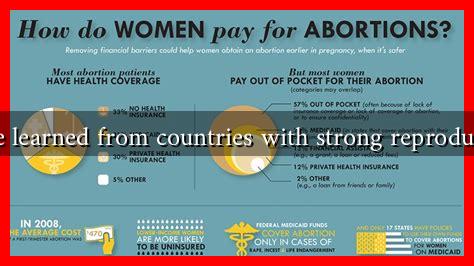-
Table of Contents
What Can Be Learned from Countries with Strong Reproductive Rights?
Reproductive rights are fundamental human rights that encompass the ability to make informed choices about one’s reproductive health, including access to contraception, safe abortion, and comprehensive sex education. Countries that prioritize these rights often experience significant social, economic, and health benefits. This article explores the lessons that can be learned from nations with strong reproductive rights, highlighting successful policies, outcomes, and the broader implications for society.
The Importance of Comprehensive Reproductive Health Services
Countries with robust reproductive rights typically provide comprehensive health services that include:
- Access to contraception and family planning services
- Safe and legal abortion services
- Sex education that is inclusive and age-appropriate
- Maternal health care and prenatal services
For instance, in Sweden, the government offers free access to contraceptives and comprehensive sex education, resulting in one of the lowest rates of unintended pregnancies in the world. According to the Swedish National Board of Health and Welfare, the unintended pregnancy rate is approximately 30% lower than the European average.
Economic Benefits of Strong Reproductive Rights
Investing in reproductive rights has significant economic implications. Countries that prioritize these rights often see:
- Increased female workforce participation
- Reduced healthcare costs associated with unintended pregnancies
- Higher educational attainment among women
For example, in Bangladesh, the introduction of family planning programs in the 1980s led to a dramatic decline in fertility rates, from 6.3 children per woman in 1980 to 2.0 in 2020. This shift has contributed to economic growth, with the World Bank estimating that the country’s GDP growth rate increased by 1.5% annually due to improved reproductive health services.
Health Outcomes and Quality of Life
Countries with strong reproductive rights often report better health outcomes for women and children. Key benefits include:
- Lower maternal and infant mortality rates
- Improved overall health and well-being
- Greater autonomy and empowerment for women
In Norway, where reproductive rights are well-established, the maternal mortality rate is one of the lowest in the world, at just 3 per 100,000 live births. This is a stark contrast to countries with restrictive reproductive policies, where maternal mortality can be as high as 500 per 100,000 live births.
Case Studies: Lessons from Around the World
Several countries serve as exemplary models for reproductive rights:
- Netherlands: Known for its comprehensive sex education and access to contraception, the Netherlands has one of the lowest rates of teenage pregnancies in Europe.
- Canada: With universal healthcare that includes reproductive services, Canada has made significant strides in reducing barriers to abortion and contraception.
- Rwanda: Following the 1994 genocide, Rwanda implemented progressive reproductive health policies, resulting in a dramatic increase in contraceptive use and a decrease in maternal mortality rates.
These case studies illustrate that strong reproductive rights not only improve individual health outcomes but also contribute to societal stability and economic growth.
Conclusion: The Path Forward
The lessons learned from countries with strong reproductive rights are clear: comprehensive reproductive health services lead to better health outcomes, economic benefits, and enhanced quality of life. As nations grapple with reproductive rights issues, it is essential to recognize the value of investing in these services. By prioritizing reproductive rights, countries can empower women, improve public health, and foster economic growth.
In conclusion, the evidence is compelling. Countries that embrace strong reproductive rights not only protect individual freedoms but also pave the way for a healthier, more equitable society. As we move forward, it is crucial to advocate for policies that uphold these rights globally, ensuring that everyone has the opportunity to make informed choices about their reproductive health.
For more information on reproductive rights and health, visit World Health Organization – Reproductive Health.

